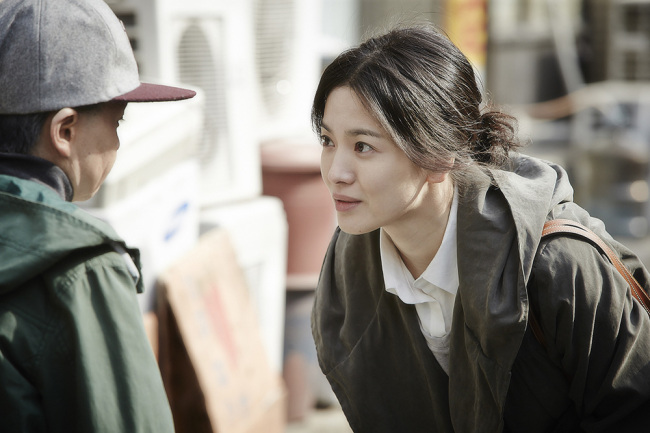“My Brilliant Life” walks an ironically palpitating line as suggested by the Korean title, which literally means “My Palpitating Life.”
As the drama film centers on a 16-year-old boy named Ah-reum who has progeria ― a rare genetic disorder that causes premature aging in children ― viewers would expect an emotionally overwhelming and downright tragic plot, like those of other Korean films tackling terminal illness. As expected, the film does put tears in viewers’ eyes. But it does more than that.
The film is serious enough to be realistic but light enough to be humorous, drawing a gentle smile out of the tragic situation, which proves that there is only a thin line between laughter and pain.
Several factors contribute to this result, including the well-matched cast of heartthrob Kang Dong-won, A-list actress Song Hye-kyo and Jo Sung-mok, who had to undergo five hours of makeup application to become the prematurely aged Ah-reum. The artful and subtle direction of filmmaker E J-yong also adds to the film.
 |
A scene from “My Brilliant Life.” (CJ Entertainment) |
But most of all, the storyline ― faithfully adapted from Korean novelist Kim Ae-ran’s 2011 best-selling novel of the same name ― is an ode to life at its brightest, a celebration of love, hope and family, with good balances between humor and seriousness and between youth and adulthood.
That said, the plot is quite simple. At age 16, Ah-reum’s body is already 80 years old, with age spots on his hands, deep wrinkles on his face and creepy skin textures. His parents, Dae-soo (Kang Dong-won) and Mi-ra (Song Hye-kyo), who had Ah-reum at the tender age of 17, work diligently each day to provide for their son. Amid Ah-reum’s grim condition, his family of three live a simple and happy life.
The simple story is flavored with charming characters who transcend their ages. The precocious child Ah-reum is wise beyond his years ― writes and talks like an adult and understands the agony of his parents ― in contrast to his father Dae-soo, who has a childlike and naive character. Dae-soo takes multiple jobs ranging from restaurant server to construction worker to support his family, but he still gets extremely excited about K-pop girl groups and sees nothing weird about eating fried chicken in front of his sick child.
The 33-year-old father Dae-soo may not be the most experienced father, yet his love for his son is genuine, and he communicates with Ah-reum like a friend throughout the film.
When Dae-soo asks his son, “What do you want to be when you grow older?” Ah-reum says he wants to become a father. “Why me, out of all good things to be?” says Dae-soo. Ah-reum quietly replies, “So I can understand what it is like to be a father.”
As both the father-son relationship and Ah-reum’s sickness deepen, the film gracefully draws casual humor out of the relationship between Ah-reum and Dae-soo, which elicit heartfelt tears.
During an interview with The Korea Herald last week, actress Song commented that “the characters are bright and cheerful, quite the contrary to traditional films about illness.
“The happier the family gets, the more the sadness escalates.”
Some parts of this heartwarming family tale fall flat, though. The film runs for two hours, yet fails to to fully capture the details of the original story and unique style of Kim Ae-ran, once labeled by a literary critic as funny but warm, unpredictable yet friendly.
The film’s loosely connected plot and story development is a bit disappointing, but the rosiest possible picture is painted out of a tragic yet special story about an old son and his young parents, as the director intended.
The heartwarming film opens in theaters Wednesday.
By Ahn Sung-mi (
sahn@heraldcorp.com)






![[Exclusive] Hyundai Mobis eyes closer ties with BYD](http://res.heraldm.com/phpwas/restmb_idxmake.php?idx=644&simg=/content/image/2024/11/25/20241125050044_0.jpg)
![[Herald Interview] 'Trump will use tariffs as first line of defense for American manufacturing'](http://res.heraldm.com/phpwas/restmb_idxmake.php?idx=644&simg=/content/image/2024/11/26/20241126050017_0.jpg)
![[Herald Review] 'Gangnam B-Side' combines social realism with masterful suspense, performance](http://res.heraldm.com/phpwas/restmb_idxmake.php?idx=644&simg=/content/image/2024/11/25/20241125050072_0.jpg)